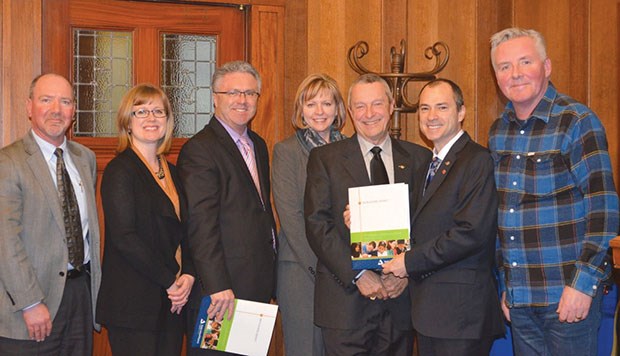A major opportunity for the Delta school district made for some engaging discussion last week at the legislature in Victoria. A delegation from the district, including superintendent Dianne Turner, board of education chair Laura Dixon, director for the KPU Institute of Sustainable Horticulture Dr. Kent Mullinix and myself met with Delta North MLA Scott Hamilton, Minister of Agriculture Norm Letnick, Minister of Education Peter Fassbender and staff.
In the cozy confines of the Birch Room, we talked about pickles.
Project Pickle has been a huge success in the district and children in our community are learning about food and the food system while enjoying the benefits of home grown produce. In the classroom and on the school neighbourhood farm, kids in our district are keeping their fingers dirty.
The Ministry of Education recently announced its "Innovation Strategy" designed to engage students with individualized and new
types of learning. For its part, the Ministry of Agriculture has been advancing its agriculture plan that has always recognized that education is a key pillar needed to ensure success of a robust food economy that the government sees contributing $14 billion to provincial revenues by 2017.
Project Pickle
shows the complexities of the food system "from seed to burger" and identifies the many jobs in the food supply chain that we tend to take for granted.
Hamilton saw some synergy here and arranged for us all to meet. The ministries are in
full support of Project Pickle and work is underway to make Delta the model for school district agriliteracy programs.
Perhaps most exciting of all is the ever-growing relationship between the district and Kwantlen Polytechnic University is going to deliver huge value to our community and pave the way for the district and the board of education to consider adding an agriculture academy.
Kwantlen has committed to developing a food system-based, university-accredited curriculum for our kids. This means that if
approved by the ministry and board of education, students in our district will be able to choose degree unit studies in grades 11 and 12.
These courses will be focused on regional food systems and the jobs within it. Food chemistry, mechanics, soil science, business, marketing and other categories within
the food system will allow future workers to receive secondyear post-secondary instruction upon graduation from high school.
This will certainly be appealing to many students who may not have previously considered careers in the in the thriving agrifood sector in B.C. New niche businesses
in agriculture and horticulture are developing all the time and are creative smaller scale alternatives that can work alongside traditional larger farming operations. Food sovereignty can be achieved through education, partnership and innovation.
Dovetailing with the B.C. Jobs Plan, this Kwantlen/school district partnership based on Project Pickle has the potential to move to other districts in the Fraser Valley, Vancouver Island and Okanagan.
Keeping a steady flow of bodies into the broad food economy can only be a good thing.



